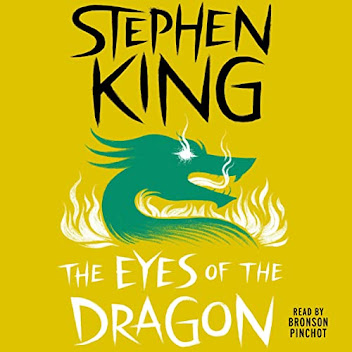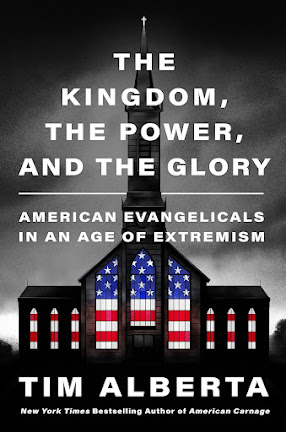WILDLAND: THE MAKING of AMERICA'S FURY (audiobook) by Evan Osnos
Published in September of 2021 by Macmillan Audio.
Read by the author, Evan Osnos.
Duration: 17 hours, 7 minutes.
Unabridged.
Evan Osnos is a reporter for The New Yorker. He was inspired to write about the phenomenon of Donald Trump and the 2016 and 2020 elections when he returned from an multi-year assignment in China and noted that politics, journalism and even economics in the United States had changed. He didn't use this analogy, but I will: Parents don't notice their kids changing and growing because they see them every day. But, the aunts and uncles who only see them at the holidays can easily detect the changes.
Evan Osnos is a reporter for The New Yorker. He was inspired to write about the phenomenon of Donald Trump and the 2016 and 2020 elections when he returned from an multi-year assignment in China and noted that politics, journalism and even economics in the United States had changed. He didn't use this analogy, but I will: Parents don't notice their kids changing and growing because they see them every day. But, the aunts and uncles who only see them at the holidays can easily detect the changes.
For Wildland Osnos went to three places that he used to live to investigate: Greenwich, Connecticut; Chicago, Illinois; and Clarksburg, West Virginia.
In West Virginia, he primarily looks at the changes in journalism such as the loss of local news and small town newspapers. He also looks at government pulling back environmental regulations and business avoiding responsibilities such as living up to pension obligations and cleaning up their messes. The shenanigans from Peabody Energy to avoid pension obligations were especially egregious.
In Connecticut he follows up on the business theme by looking at Greenwich - a town seemingly full of hedge fund managers. Really, it's not, but their wealth and their change of mindset is changing the town. The mindset embraces famed economist Milton Friedman's maxim that the purpose of a corporation is to maximize returns for its shareholders. I grew up in a town with one very large corporation with multiple factories. It provided scholarships, paid for public art and architecture and provided benevolent leadership through boards, committees and generally being engaged with the community that its leadership lived in and provided its labor force.
In Chicago, he looks at the near-collapse of some communities - the ones that make the news all of the time for the murders. He discusses how the manufacturing base of Chicago left and how that helped lead to the decline of some neighborhoods. which ties into the Greenwich part of the book.
On top of all of this, throw in the Supreme Court case generally known Citizens United. It opened up the flood gates for money in politics. Now millions of dollars could be spent on primary campaigns. In 2020, my state was not really a player in Presidential politics, but we saw almost non-stop ads over 1 race for the House of Representatives. One ad after another from both sides. Those kinds of ad campaigns are the result of the Citizens United decision in 2010. The Supreme Court held that the First Amendment prohibits the government from restricting independent expenditures for political campaigns by corporations, including non-profit corporations, labor unions, and other associations. With that decision, politics changed.
Outsiders with a lot of money now had a chance to come in and be effective without having the strong organization and the political contacts of a political party.
In West Virginia, he primarily looks at the changes in journalism such as the loss of local news and small town newspapers. He also looks at government pulling back environmental regulations and business avoiding responsibilities such as living up to pension obligations and cleaning up their messes. The shenanigans from Peabody Energy to avoid pension obligations were especially egregious.
In Connecticut he follows up on the business theme by looking at Greenwich - a town seemingly full of hedge fund managers. Really, it's not, but their wealth and their change of mindset is changing the town. The mindset embraces famed economist Milton Friedman's maxim that the purpose of a corporation is to maximize returns for its shareholders. I grew up in a town with one very large corporation with multiple factories. It provided scholarships, paid for public art and architecture and provided benevolent leadership through boards, committees and generally being engaged with the community that its leadership lived in and provided its labor force.
In Chicago, he looks at the near-collapse of some communities - the ones that make the news all of the time for the murders. He discusses how the manufacturing base of Chicago left and how that helped lead to the decline of some neighborhoods. which ties into the Greenwich part of the book.
On top of all of this, throw in the Supreme Court case generally known Citizens United. It opened up the flood gates for money in politics. Now millions of dollars could be spent on primary campaigns. In 2020, my state was not really a player in Presidential politics, but we saw almost non-stop ads over 1 race for the House of Representatives. One ad after another from both sides. Those kinds of ad campaigns are the result of the Citizens United decision in 2010. The Supreme Court held that the First Amendment prohibits the government from restricting independent expenditures for political campaigns by corporations, including non-profit corporations, labor unions, and other associations. With that decision, politics changed.
Outsiders with a lot of money now had a chance to come in and be effective without having the strong organization and the political contacts of a political party.
The book takes a long time to develop and I nearly quit several times in the first couple of hours. There was so much talk of hedge fund managers and the new prevailing mercenary quality in big business. Notice that I said "prevailing" - the mercenary quality has always been there but it was restrained by other cultural norms. But, once it moves on to West Virginia and Chicago the book got more interesting to me. I guess it's simply because I don't know ultra-rich hedge fund managers and I don't identify with that lifestyle, but I do know poor black people in a big city and I grew up in a rural area.
At the halfway point, he starts to tie all of this stuff together and then the book gets good. About 3/4 of the way through the book he starts to tie in the rise of Trumpism. To be honest, I had forgotten that this was the point of the book in the frist place. Osnos ties it together. It's not some big nefarious plot, but rather the result of a lot of forces converging - the Citizens United decision, the change in the philosophy of big business, the loss of local news reporting, the loss of good jobs in rural areas and the big cities all come together.
Toss in a great deal of frustration, Osnos makes it seem that the arrival of a person like Donald Trump was inevitable. I contend that it also explains Bernie Sanders. Like Trump, Sanders is truly a political outsider. Sanders isn't even a member of the Democrat party and has not put in a lot of work building the party organization. Still, he almost won their nomination in 2016 and ran very strong in 2020 because this decision lets money make up for not being part of a party and having access to all of the connections and organization that political parties can provide.
This book doesn't have a lot of answers, but it points out a lot of problems and you have to know what the problems are before solutions can be found.
I rate this audiobook 5 stars out of 5. It can be found on Amazon.com here: WILDLAND: THE MAKING of AMERICA'S FURY by Evan Osnos.
I rate this audiobook 5 stars out of 5. It can be found on Amazon.com here: WILDLAND: THE MAKING of AMERICA'S FURY by Evan Osnos.












Comments
Post a Comment